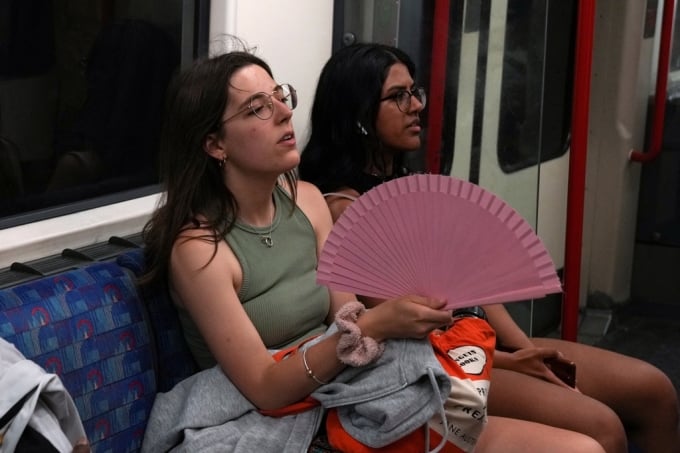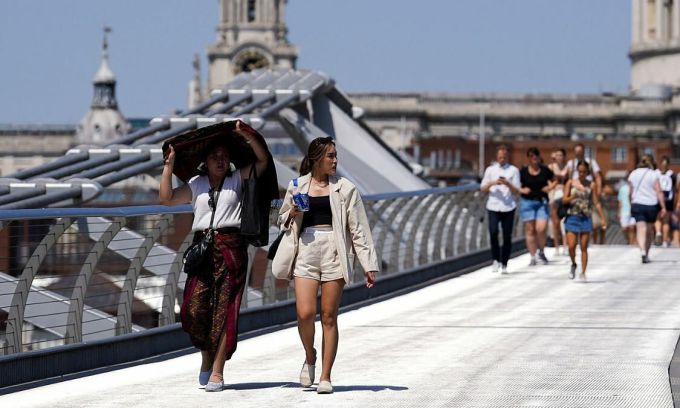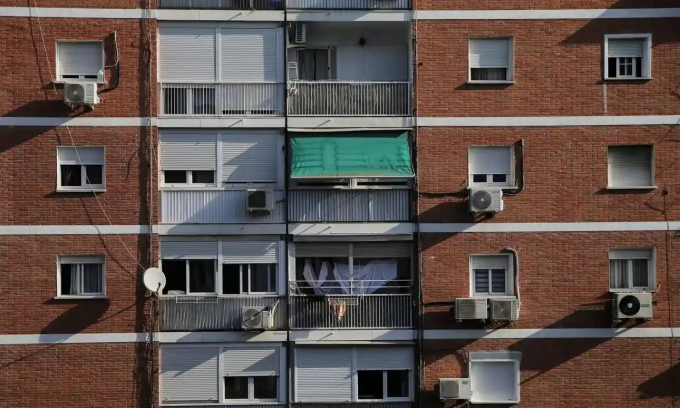Europeans once believed that air conditioning was unnecessary due to their temperate climate, but this notion is gradually changing as the continent experiences increasingly intense heat.
When Britain recorded its highest temperature on record last July, some people still used "classic" ways to cool down, such as paper fans, wet towels and lots of ice.
Others say it is time for a change in Britain. Amid record heatwaves, they are ready to install air conditioning, something many Europeans have long considered a luxury, an unnecessary and an environmental threat in temperate climates.
British retailer Sainsbury’s reported a 2,420% increase in air conditioning sales during a hot week in July 2022. Demand for air conditioning has also surged in London, with waiting lists for installers stretching into the autumn.

A woman uses a paper fan while traveling on the London Underground on a hot day on July 17, 2022. Photo: Reuters
Air conditioning is common in European offices, but extremely rare in private homes. Meanwhile, 90% of American homes have some form of air conditioning, according to US census data. European experts and leaders have for decades viewed America's reliance on air conditioning as "an example of wasteful spending".
“Addiction to conditioning is the most widespread and least recognized disease in modern America,” economist Gwyn Prins of the University of Cambridge, England, warned in a 1992 study.
According to a survey by the Japanese air conditioning corporation Inaba Denko, only 3% of German households have air conditioning, while the rate in France and Germany is less than 5%. Another reason for the low level of air conditioning usage in Europe is that the region has rarely experienced the intense and prolonged heat waves that some parts of the United States have in recent decades.
Even on the hottest days, Rome is not as hot and humid as Seoul, Tokyo or Washington. In Britain, where there are more rainy days than sunny ones, houses are often built to keep warm rather than cool.

A woman covers her head in the hot sun at Millennium Bridge, London, England on July 18, 2022. Photo: Reuters
But over the past two decades, Europe has experienced increasingly hot summers as climate change has exacerbated the problem. Heatwaves have become more intense, longer and more frequent, leading Europeans and officials to become more open to air conditioning, especially in the south.
In 2018, the International Energy Agency (IEA) recorded a surge in the number of homes with air conditioning in Italy, Spain, Greece, and southern France. The IEA then predicted that the number of air conditioners in Europe would more than double, from 110 million units in 2019 to 275 million units in 2020.
Europeans are also slowly accepting that air conditioning, once considered a luxury, can now “save lives”. In 2003, a heatwave swept through France, killing around 15,000 people, mostly elderly people. Air conditioning was subsequently installed in many nursing homes to protect the most vulnerable.
“People are starting to think that summers are going to be hotter more often, so they are trying to find long-term solutions for the future,” said Mark Salmon, a retail manager at Sainsbury’s in the UK, during the peak of last year’s heatwave, adding that the company received about 300 calls for advice a day, compared with 20 a day in a “normal summer”.
Mr Salmon said that air conditioning was difficult to install in warm-weather homes in the UK, but not impossible. Homes in the UK can still be fitted with central air conditioning “with minimal noise”. However, if the property is in a “conservation zone” or a block of flats, the landlord will need to apply for a number of permits to install air conditioning.
Before installing air conditioning in such apartments, homeowners must obtain planning permission from local authorities. Approval will depend on the location of the apartment and the size of the air conditioning, as well as the risk of noise pollution in densely populated areas.
After installation, air conditioners are also regularly inspected by authorities for energy efficiency, performance and regulatory advice. If homeowners fail to produce inspection records when requested, they could face a fine of £300 ($375).
However, the increasing use of air conditioning by Europeans also raises questions about sustainability.

Air conditioners installed in some apartments in Madrid, Spain in 2022. Photo: Reuters
The IEA has warned of a potential “cooling crisis” as demand for air conditioning outstrips the capacity of grids and other energy sources. During last year’s European heatwave, authorities asked people to use less energy due to concerns about Russian gas supplies.
Air conditioners can put a strain on the grid because they tend to be turned on all at the same time, like during the hottest part of the day. 10% of global electricity consumption comes from cooling devices like air conditioners, much of which comes from fossil fuels.
“Air conditioning gets a bad rap for this reason,” says Kevin Lane, energy analyst at the IEA.
There are new, energy-efficient alternatives to air conditioning, such as heat pumps. In cooler climates with short heat waves, measures such as reflective roofs and improved ventilation can reduce the need for air conditioning.
Still, air conditioning is expected to be a part of Europe's future. Cox, a resident of France, said Europeans can't be blamed for rushing to buy air conditioning when the heat hits. "Many people said the terrible heatwave of 2003 only happens once every few centuries. But 19 years later, it's back," she said.
Duc Trung (According to Washington Post, Technology Review )
Source link




















































![[Maritime News] More than 80% of global container shipping capacity is in the hands of MSC and major shipping alliances](https://vphoto.vietnam.vn/thumb/402x226/vietnam/resource/IMAGE/2025/7/16/6b4d586c984b4cbf8c5680352b9eaeb0)













































Comment (0)